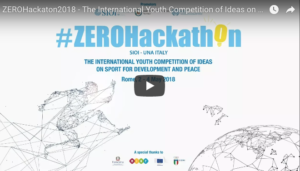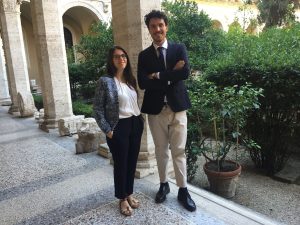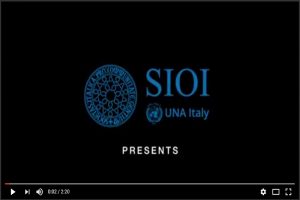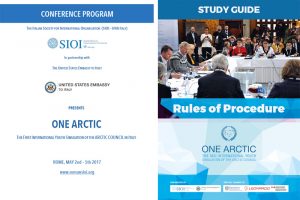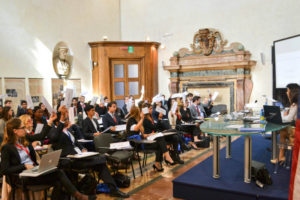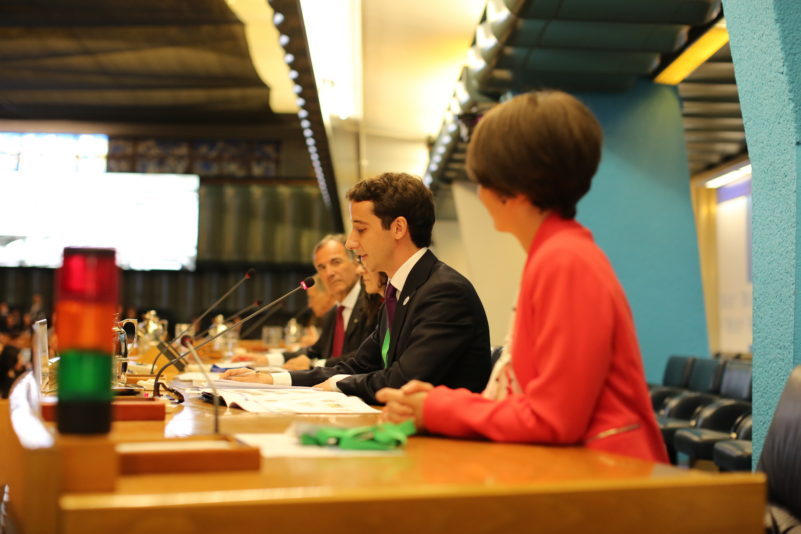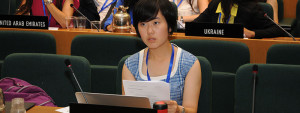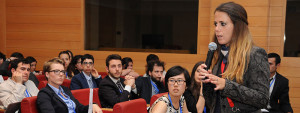SIOI 2016 - All rights reserved.
[vc_row bk_type=”boxed_look”][vc_column width=”1/1″][prkwp_spacer size=”20″][prkwp_styled_title prk_in=”THE CHALLENGE” align=”Center” text_color=”#1e73be”][prkwp_spacer size=”40″][vc_column_text]
#ZEROHackathon will focus on the theme that World Food Day is carrying for this year: “Climate is changing, food and agriculture must too”.
As we know, climate change is shaking up the cycle of production of food that we have known and lived by for centuries. As the weather gets unpredictable, temperatures rise and rainfall changes, climate change is threatening agricultural productivity and putting global food security at risk. Our societies are struggling to tackle these extremely complex issues, and a virtuous cycle is taking hold at a very slow pace.
What is #ZEROHackathon? Exactly what you make it.
The aim here is not to elaborate resolutions, but rather to deliver the idea of a final proposal that can effectively help our societies live and grow in line with the implementation of the Sustainable Development Goals (SDGs).
All will be done by:
-
Connecting interdisciplinary students from all over the world, as well as their knowledge and skills
-
Sharing data, experiences, challenges, and method with the help of FAO technical experts, professionals, institutional representatives and teachers that will cooperate with the contestants
-
Impacting with innovative solutions that will constitute concrete solutions to tackle the main crises that are threatening global stability and help all of us include respect for SDGs in our everyday lives.
During hackathon, you will have the opportunity to discuss and exchange ideas with peers and experts on specific barriers to sustainable development pertaining five general aspects of the issue.
[/vc_column_text][/vc_column][/vc_row][vc_row bk_type=”boxed_look”][vc_column width=”1/1″][vc_column_text]
TOPICS |
[/vc_column_text][prkwp_spacer size=”20″][vc_column_text]
The competition will be divided into 5 thematic areas, but the specific issues to be discussed and worked on will be revealed on the first day of the event.
All applicants should express three preferences for the thematic area of choice.
[/vc_column_text][prkwp_spacer][/vc_column][/vc_row][vc_row bk_type=”boxed_look”][vc_column width=”1/2″][vc_single_image image=”2962″ img_size=”full” alignment=”center”][prkwp_spacer][vc_column_text]
This is the main theme of World Food Day, and it’s meant to emphasize the tight link between climate change and the cycle of food production. Climate change is already putting stress on food systems and rural livelihoods all around the globe. No other sector is more sensitive to climate change than agriculture. Climate change is undermining food production, while existing agricultural practices and patterns of agricultural development threaten the natural resources on which farming depends. For the world’s poorest, adaptation to climate change means ensuring food security. Sustainable natural resource management is key to ensure food security for a growing global population, as well as to mitigate climate change through ecosystem services. There are some improvements that have already been done, like improved natural resource management, improved soil fertility and in an increase in ecosystems services and a reduction of fossil fuel use.
HACK RESOURCES!
World Food Day – Communication Toolkit
World Food Day 2016 – Climate Actions
FAO The State of Food and Agriculture 2016
European Climate Change Programme Policies
[/vc_column_text][/vc_column][vc_column width=”1/2″][vc_single_image image=”2963″ img_size=”full” alignment=”center”][prkwp_spacer][vc_column_text]
There is enough food for everyone on the planet today, yet almost 800 million people suffer hunger. The reason behind hunger is poverty, not lack of food. Access to food is the most significant basic need by far. Zero Hunger means food and water availability for all. This means fighting against inequality in food distribution, working for an efficient water management system, and preserving resources that future generations will need to survive. Leadership of young people and empowered women are crucial to end hunger by 2030. Furthermore, population growth is posing serious challenges to the achievement of the Sustainable Development Goals concerning food and water availability. If resources are limited and the world population is growing, how are future generations supposed to have equal access to food and clean water?
HACK RESOURCES!
FAO Director-General encourages young people to be the Zero Hunger Generation
FAO Sustainable Development Goals
FAO Key to achieving the 2030 Agenda for Sustainable Development
Fighting Hunger together with the European Union
[/vc_column_text][/vc_column][/vc_row][vc_row bk_type=”boxed_look”][vc_column width=”1/2″][vc_single_image image=”2964″ img_size=”full” alignment=”center”][prkwp_spacer][vc_column_text]
At present more than 50 percent of the world’s population is living in urban areas and it is expected to rise to 70 percent by 2050. This causes an enormous challenge to conventional food production and supply. Food and nutrition security of poor urban populations is and remains at risk as a consequence of the volatility and rapid increases in food prices, natural disasters and climate change effects. Moreover, there is the need to enable local authorities to ensure governance of dynamic and sustainable food systems, contributing to the realization of the right to food and to the promotion of sustainable diets, with strong urban-rural linkages and enabling the involvement of all key local stakeholders, with particular attention to smallholder farmers and local authorities. The challenge is to steer urbanization from its current, unsustainable path, towards sustainable, greener cities that offer their inhabitants choice, opportunity and hope. Furthermore, this calls for an optimisation of food production cycles that includes: reduction of input and waste, better management of food supply, the promotion of a healthier, more sensible and sustainable culture of food.
HACK RESOURCES!
FAO Sustainable Development Goals
FAO Food for the Cities Programme
EU Regional and Urban Development
Short food supply chains and local food systems in the EU
Urban and peri-urban horticulture development in practice: FAO’s approach
FAO 8 factsheets on urban issues
[/vc_column_text][/vc_column][vc_column width=”1/2″][vc_single_image image=”3051″ img_size=”full” alignment=”center”][prkwp_spacer][vc_column_text]
This year the International Court of Justice has decided that from now on environmental crimes will be treated as war crimes. Many times conflicts around the world are generated by the exploitation of natural resources, the generation of wastes and the degradation and commodification/privatization of environmental goods. Environmental crimes firmly affects both water quality and food safety. 2 million people die annually for causes related to unsafe water, poor sanitation and hygiene. Moreover, food safety is strongly linked to the quality of water used at each step of the food chain from production to consumption. But punishing environmental crimes after they have been committed will not repair the damage they have posed on our environment and planet. Environmental processes and food systems needs to be more controlled. We need solutions that will help prevent these crimes from being perpetrated or spot them at an early stage.
HACK RESOURCES!
FAO Sustainable Development Goals
FAO CLIMATE CHANGE: Implications for Food Safety
FAO Water Quality and Food Safety
Environmental Crime EUROPEAN UNION
[/vc_column_text][/vc_column][/vc_row][vc_row bk_type=”boxed_look”][vc_column width=”1/2″][vc_single_image image=”3053″ img_size=”full” alignment=”center”][prkwp_spacer][vc_column_text]
Climate change, the melting of ices, alterations of water temperature, acidification and pollution are posing enormous threats to marine life. Many marine species live today in danger of habitat destruction, which is detrimental for their adaptation and, in some cases, a cause of premature extinction. Ocean acidification is also extremely dangerous for corals, which provide a safe haven from predators and an area for reproduction, posing marine life to even harsher threats. The sea is an extremely complex equilibrium that must be preserved, otherwise the consequences could be devastating.
[/vc_column_text][/vc_column][vc_column width=”1/2″][prkwp_spacer][vc_column_text]
HACK RESOURCES!
FAO Sustainable Development Goals
FAO Global Record of Fishing Vessels Refrigerated Transport Vessels and Supply Vessels
General Fisheries Commission for the Mediterranean
NEAFC North East Atlantic Fisheries Commission
Northwest Atlantic Fisheries Organization
EUROPEAN UNION – The Common Fisheries Policy
[/vc_column_text][/vc_column][/vc_row][vc_row][vc_column width=”1/1″][vc_column_text]
TOOLS |
[/vc_column_text][prkwp_spacer size=”20″][vc_tta_tabs active_section=”1″][vc_tta_section title=”Open Data Sources” tab_id=”1480329491884-2ae1a510-7809″][prkwp_spacer size=”20″][vc_column_text]
[/vc_column_text][/vc_tta_section][vc_tta_section title=”Open Source Software” tab_id=”1480329492034-daa62937-3269″][prkwp_spacer size=”20″][vc_column_text]
Photo editing
PhotoDirector 8 Essential
GIMP (Consigliato, leggero ma molto potente)
Slide Presentation
Open Office (Suite Office gratuita molto simile a quella Microsoft)
Editing Audio
Audacity (Semplice e immediato)
Reaper (più professionale, richiede maggiori conoscenze tecniche)
Editing Video
MOVAVI (Sul sito ha anche software free per slideshow e foto editing)
AVS (Della stessa casa sono disponibili software audio, foto e office sempre free)
FILMORA (Anche per Mac)
VIRTUAL DUB
OpenShot Video Editor[/vc_column_text][/vc_tta_section][vc_tta_section title=”Graphic Resources” tab_id=”1480329496793-c6f5dd68-ce6a”][prkwp_spacer size=”20″][vc_column_text]
Pictures, Vectors and icons
Google Images
Wikimedia Commons
(If you have any doubts, check Wikimedia Commons’ informative on reusing content outside Wikimedia)
Pixabay
Pexels
Skitterphoto
StockSnap.io
The Noun Project (Icons)
Colour Lovers (Colour schemes / palettes)
Adobe color (Colour schemes / palettes)
Freepik
(If you have any doubts, check Freepik’s terms of use here)
Fonts
DaFont
HypeForType
FontStruct
FontPair
[/vc_column_text][/vc_tta_section][vc_tta_section title=”Map Creator” tab_id=”1480329498042-83f22817-21b7″][prkwp_spacer size=”20″][vc_column_text]
Step Map
BatchGeo
Lizard Point
Maptive
[/vc_column_text][/vc_tta_section][vc_tta_section title=”Licensing and toolkit” tab_id=”1480331132691-41baa66a-9ebe”][prkwp_spacer size=”20″][vc_column_text]Licensing and attributing
Toolkit slideshow[/vc_column_text][/vc_tta_section][/vc_tta_tabs][vc_tta_accordion][vc_tta_section title=”Open Data Sources” tab_id=”1480332223662-f897effc-1a34″][vc_column_text]
[/vc_column_text][/vc_tta_section][vc_tta_section title=”Open Source Software” tab_id=”1480332223867-09d89cc8-7ad1″][vc_column_text]
Photo editing
PhotoDirector 8 Essential
GIMP (Consigliato, leggero ma molto potente)
Slide Presentation
Open Office (Suite Office gratuita molto simile a quella Microsoft)
Editing Audio
Audacity (Semplice e immediato)
Reaper (più professionale, richiede maggiori conoscenze tecniche)
Editing Video
MOVAVI (Sul sito ha anche software free per slideshow e foto editing)
AVS (Della stessa casa sono disponibili software audio, foto e office sempre free)
FILMORA (Anche per Mac)
VIRTUAL DUB
OpenShot Video Editor[/vc_column_text][/vc_tta_section][vc_tta_section title=”Graphic resources” tab_id=”1480332229204-00d07f40-b311″][vc_column_text]
Pictures, Vectors and icons
Google Images
Wikimedia Commons
(If you have any doubts, check Wikimedia Commons’ informative on reusing content outside Wikimedia)
Pixabay
Pexels
Skitterphoto
StockSnap.io
The Noun Project (Icons)
Colour Lovers (Colour schemes / palettes)
Adobe color (Colour schemes / palettes)
Freepik
(If you have any doubts, check Freepik’s terms of use here)
Fonts
DaFont
HypeForType
FontStruct
FontPair
[/vc_column_text][/vc_tta_section][vc_tta_section title=”Map creator” tab_id=”1480332230474-edd117a8-0c70″][vc_column_text]
Step Map
BatchGeo
Lizard Point
Maptive
[/vc_column_text][/vc_tta_section][vc_tta_section title=”Licensing and toolkit” tab_id=”1480332231553-ec65d75e-e432″][vc_column_text]Licensing and attributing
Toolkit slideshow[/vc_column_text][/vc_tta_section][/vc_tta_accordion][/vc_column][/vc_row]
Leave a Comment





